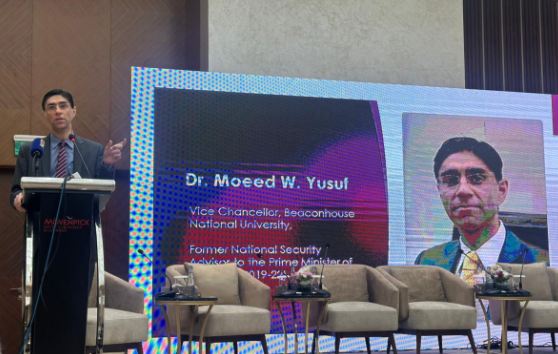By BCPR
ISLAMABAD, NOV 26 /DNA/ – In a significant policy dialogue titled “Redefining Regional Connectivity: Pakistan–China Friendship in the New Geo-Economic Paradigm,” leading thinkers and policymakers today outlined an ambitious vision for transforming South Asia’s economic landscape through enhanced Pakistan-China cooperation and an upgraded CPEC framework. The event, hosted by Beaconhouse National University’s Center for Policy Research (BCPR) in collaboration with the Understanding China Forum (UCF), brought together diplomats, scholars, and security experts to explore pathways for turning geopolitical challenges into economic opportunities.
The dialogue opened with remarks from Dr. Zainab Ahmed, Deputy Director of BCPR, and Dr. Hassan Daud of UCF, setting the stage for what would become a comprehensive examination of Pakistan’s strategic options in a rapidly changing global order.
Dr. Moeed Yusuf, former National Security Advisor to the Prime Minister of Pakistan and Vice Chancellor of Beaconhouse National University, set the tone by advocating for a pragmatic approach to regional connectivity. “There is no ‘either or’ choice between partners,” he stated, directly addressing the ongoing US-China strategic competition. Dr. Yusuf proposed a “China-South Asia + Central Asia” economic framework as the most viable path forward, suggesting that this model of Cooperative Geoeconomics could transform Pakistan from being an assistance-driven to a development-driven nation. He argued that as this economic bloc integrates, India would naturally recognize the opportunity cost of remaining outside, potentially creating conditions for reduced regional tensions.
The keynote address by His Excellency Mr. Jiang Zaidong, Ambassador of the People’s Republic of China to Pakistan, provided concrete evidence of what has been achieved and where the partnership is headed. Celebrating CPEC’s accomplishments, including US $25.93 billion in direct investment, over 8,000 megawatts of power generation, and 261,000 jobs created, Ambassador Jiang announced the formal transition to “CPEC 2.0.” He emphasized that “sufficient power utilizes all industry” and revealed major new investments, including a US $400 million home appliance industrial park by Haier and a US $150 million textile industrial park by the Challenge Group. Looking regionally, he committed to accelerating the Karakoram Highway realignment and developing Gwadar Port as a hub for connectivity, while expressing China’s readiness to actively and steadily advance third-party cooperation under CPEC toward Central Asia and the Middle East.
Ambassador Sardar Masood Khan, former President of AJK and former Ambassador to the USA and China, provided strategic context by observing that “China is changing the status quo and adapting to the new order while the US is trying to hold onto the postwar one.” He stressed the necessity of Pakistan maintaining an “impregnable nuclear program” for deterrence while walking the delicate line of maintaining a balance with the US and China. Most importantly, he urged Pakistan to conceive of itself as a consequential nation capable of shaping its own destiny.
The first panel, “Connectivity, Cooperation, and Peace: Reframing Regional Geoeconomics,” moderated by Dr. Hassan Daud, featured robust discussion about Pakistan’s strategic choices. Ambassador Masood Khalid, former ambassador of Pakistan to China, emphasized that CPEC has unleashed a healthy dialogue on the need to improve all industries in Pakistan and an imperative to counter uncertainty Mr. Haroon Sharif , former minister of state, provided a critical analysis of the changing world order, emphasizing the tension between multilateralism and unilateralism. He stressed the urgent need to reposition Pakistan’s geoeconomic strategy, noting that “connectivity is the means, not the solution.” Mr. Sharif identified four critical fault lines: the lack of inclusive and dignified opportunities, low productivity and production capacity, reluctance of local investors to come forward, and the uncertain impact of technology on society. “A crucial “mindset shift needed from G2G” approaches, he concluded, would enable Pakistan to “rebuild brick by brick instead of selling dreams.”
Dr. Zafar Nawaz Jaspal, Dean Schoolf of Politics and IR at QAU, offered a realistic assessment, characterizing the Pakistan-China alliance as “transactional” and warning against rhetorical nostalgia. He insisted that “bandwagoning is not a solution” and that Pakistan must make rational calculations to maintain strategic balance between major powers. Ms. Nasim Zehra, senior journalist, highlighted information warfare dimensions, calling narrative “a very potent weapon” in the “battle of whose stories are to win.” Ambassador Riffat Masood, former ambassador of Pakistan to Iran, pointed to internal challenges, noting a “local lack of a progressive and positive mindset” as a major impediment to regional integration, while Mr. Usman Shaukat from Rawalpindi Chamber of Commerence, emphasized that “economic security is gaining more importance for nations than geopolitics,” calling for predictable regulatory frameworks and expanded regional supply chains that could potentially include Bangladesh.
The second session, “From Corridors to Cooperation: Pakistan–China Partnership and the Future of Regional Geoeconomics,” moderated by Dr. Zainab of BCPR, delved into practical implementation. Rear Admiral Javed Iqbal (Retd), president designate NIMA, highlighted Pakistan’s maritime future, noting “over 90% reliance” on sea trade and advocating for Gwadar’s development as a regional hub, even proposing the “possibility of Pakistan-made merchant ships.” Ambassador Jauhar Saleem, president IRS, provided a sobering assessment of regional security challenges, revealing that terrorist incidents had surged from 284 in 2019 to over 526 in 2025, primarily emanating from Afghanistan. Dr. Talat Shabir, director China-Pak study Center at ISSI, discussed the Shanghai Cooperation Organization’s growing importance in connecting Eurasia, while senior journalist Ejaz Haider stressed the necessity of involving local stakeholders in CPEC development and policy decisions.
The dialogue concluded with remarks from former Minister Khurram Dastagir, who emphasized recognizing “cross-sectoral resistance to modernization” as a key challenge. Collectively, the event painted a picture of a nation at a strategic crossroads, with CPEC 2.0 offering a pathway to not just economic growth but a redefinition of Pakistan’s role in an emerging multipolar world. As Pakistan and China approach the 75th anniversary of their diplomatic relations, the consensus was clear: the partnership has never been more crucial for shaping regional stability and prosperity.

















